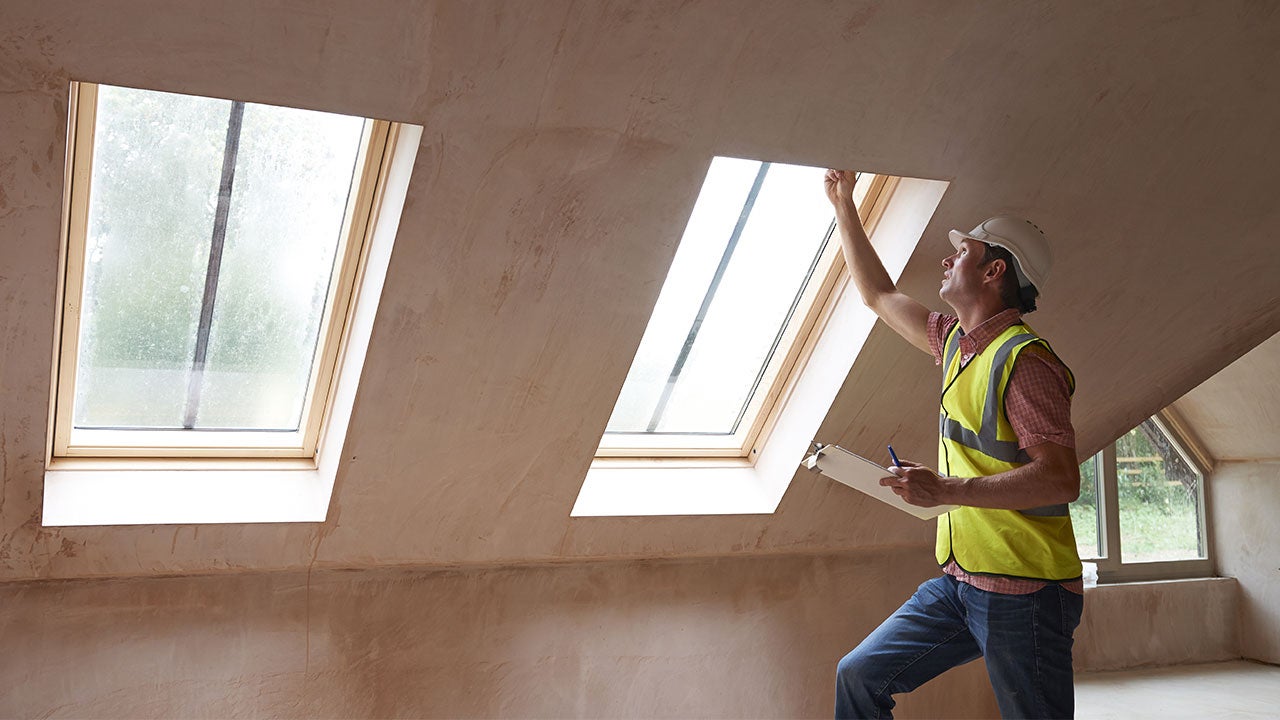Home>Home Maintenance>What Should A Buyer Do After A Home Inspection?


Home Maintenance
What Should A Buyer Do After A Home Inspection?
Modified: March 6, 2024
After a home inspection, buyers should prioritize home maintenance tasks. Find out what steps to take to ensure your new home stays in great condition.
(Many of the links in this article redirect to a specific reviewed product. Your purchase of these products through affiliate links helps to generate commission for Storables.com, at no extra cost. Learn more)
Introduction
Buying a new home is an exciting endeavor, but it comes with its share of responsibilities. One crucial step in the home-buying process is the home inspection. A thorough inspection reveals the condition of the property and can help you make an informed decision about your purchase.
After the home inspection, it’s essential to take certain steps to ensure that you are fully aware of any issues and can address them appropriately. In this article, we will outline what buyers should do after a home inspection to navigate the post-inspection phase with confidence.
Key Takeaways:
- Review the inspection report carefully and prioritize safety and functionality issues for immediate attention. Consult with professionals and negotiate repairs or price reductions with the seller to ensure a smooth home-buying process.
- Plan for future maintenance and upgrades to enhance the value and enjoyment of your new home. Work closely with your real estate agent, attorney, and lender to finalize the closing process and become the proud owner of your new space.
Review the Inspection Report
Once you receive the inspection report from the inspector, take the time to review it thoroughly. The report will provide a detailed assessment of the home’s condition, including any areas of concern or potential problems.
Pay close attention to the summary section, which should highlight the most critical issues discovered during the inspection. Look for any structural problems, water damage, electrical issues, plumbing leaks, or safety hazards. Understanding the severity and extent of these issues will help you prioritize your next steps.
As you review the report, keep in mind that no home is perfect. It’s common to find some minor issues, such as leaky faucets or worn-out carpets. However, focus on the major issues that could significantly impact the value or safety of the property.
If you have any questions or require clarification about certain findings in the report, don’t hesitate to reach out to the inspector. They should be available to answer your questions and provide additional information.
Remember, the home inspection report is a tool to help you make an informed decision. It’s important to approach it with a balanced perspective and rely on the expertise of the inspector to guide your understanding of the property’s condition.
Prioritize and Evaluate Issues
After reviewing the inspection report, it’s time to prioritize and evaluate the issues that were identified. Not all problems carry equal weight, and some may require immediate attention while others can be addressed over time.
Start by categorizing the issues into different levels of priority. Focus on those that are crucial for the safety and habitability of the home, such as electrical or structural issues. These should be addressed as soon as possible.
Next, consider issues that may affect the home’s functionality and could lead to further damage if left unattended. This might include plumbing leaks or roof repairs. While not as urgent as safety concerns, they should still be addressed in a timely manner to prevent further deterioration.
Finally, examine any cosmetic or minor issues that don’t impact the overall integrity of the home. These could be things like peeling paint, outdated fixtures, or minor cracks. While they may not require immediate attention, addressing them can improve the aesthetics and enjoyment of your new home.
During the evaluation process, it’s crucial to consider your budget and resources. Determine how much you are willing to spend on repairs and upgrades, and factor in the cost of hiring professionals if needed. This will help you make informed decisions about which issues to address and how to move forward.
It can also be helpful to consult with a trusted contractor or handyman who can provide insights and estimate costs for the repairs. They can give you an expert opinion on the severity of the issues and any potential hidden costs that may arise during the repair process.
By prioritizing and evaluating the identified issues, you can develop a clear plan of action for addressing them and ensure that you’re making the most effective use of your time and resources.
Consult with Professionals
Once you have identified the issues and prioritized them, it’s advisable to consult with professionals who specialize in the relevant areas. Their expertise can provide valuable insights and guidance in making informed decisions.
Depending on the nature of the issues, you may need to consult with different professionals such as plumbers, electricians, or contractors. For example, if there are plumbing leaks, it’s important to consult with a licensed plumber who can assess the problem and recommend the best course of action.
When engaging professionals, be sure to vet them carefully. Seek recommendations from friends, family, or your real estate agent, and choose professionals who have a good reputation and experience in their respective fields.
During consultations, provide the professionals with the inspection report and any other relevant documentation. This will help them get a comprehensive understanding of the issues and enable them to provide accurate assessments and recommendations.
Listen to their professional advice and ask questions about the repair or maintenance process. They can provide you with realistic timelines, cost estimates, and alternatives depending on your budget and preferences.
Keep in mind that different professionals may have different perspectives or recommendations. It’s beneficial to get multiple opinions and compare them before making a final decision.
Consulting with professionals will not only ensure the proper resolution of issues but also provide you with peace of mind, knowing that the repairs or upgrades are being handled by experts in their respective fields.
After a home inspection, a buyer should carefully review the inspector’s report and prioritize any necessary repairs. They should also consider negotiating with the seller for repairs or a reduction in the sale price.
Negotiate Repairs or Price Reduction
Armed with the information from the inspection report and advice from professionals, you are now ready to negotiate repairs or a price reduction with the seller. This step is crucial in ensuring that any necessary repairs or issues are appropriately addressed before finalizing the purchase.
If there are significant issues discovered during the inspection, you have a few options. One option is to request that the seller complete the necessary repairs before the closing. This ensures that the issues are resolved and the property meets the agreed-upon standards.
Alternatively, you can negotiate a reduction in the purchase price to compensate for the cost of the repairs you will undertake after the purchase. This can be a viable option if you prefer to oversee the repairs yourself or if the seller is unwilling or unable to complete the repairs.
When entering into negotiations, it’s important to remain respectful and open-minded. Remember, the goal is to reach a mutually beneficial agreement that addresses the issues and satisfies both parties. Keep in mind that the seller may not be obligated to agree to your requests, so be prepared to negotiate and find common ground.
Present the inspection report findings and any estimates or recommendations from professionals as supporting evidence for your requests. This will strengthen your position and demonstrate the legitimacy of your concerns.
It’s worth noting that not all issues may be negotiable, especially if they were disclosed prior to the sale. If the property was sold “as-is,” it may limit your ability to request repairs or price reductions. However, it’s still essential to have open and transparent communication with the seller to ensure that both parties are satisfied with the outcome.
Consult with your real estate agent or attorney to guide you through the negotiation process. They can provide valuable insights and facilitate effective communication between you and the seller.
Remember, negotiations can sometimes be lengthy and involve back-and-forth discussions. Stay patient, maintain clear communication, and be willing to compromise to reach an agreement that is fair for both parties.
Consider Future Maintenance and Upgrades
While addressing the immediate repairs and negotiation with the seller, it’s also essential to consider the future maintenance and potential upgrades for your new home. This forward-thinking approach will help you plan ahead and ensure the long-term enjoyment and value of your investment.
As you review the inspection report and consult with professionals, take note of any suggestions or recommendations for ongoing maintenance. This may include regular servicing of HVAC systems, periodic roof inspections, or proper drainage maintenance.
Developing a maintenance schedule and budget can help you stay on top of these recommended tasks and avoid potential issues down the line. Consider creating a checklist or using digital tools to set reminders for routine maintenance tasks.
In addition to maintenance, think about potential upgrades or renovations that can enhance the functionality, aesthetics, and value of your home. This could involve updating outdated fixtures, remodeling the kitchen or bathrooms, or improving energy efficiency with updated appliances or insulation.
Consider your budget, timeline, and priorities when deciding which upgrades to pursue. Consult with professionals or do research to understand the potential return on investment for different types of renovations and prioritize accordingly.
Remember to strike a balance between your personal preferences and market trends. While it’s essential to make your home reflect your style and preferences, be mindful of choices that may limit the appeal of your property if you decide to sell in the future.
It’s also worth considering the future needs of your household. If you’re planning to expand your family, aging-in-place modifications, or accommodating home offices or multigenerational living arrangements, it’s beneficial to factor these into your future home maintenance and upgrade plans.
By considering future maintenance and potential upgrades, you can proactively plan and budget for necessary improvements, ensuring that your new home remains in top condition and meets your evolving needs and preferences.
Move Forward with the Closing Process
Once the necessary repairs and negotiations have been addressed, it’s time to move forward with the closing process. This is the final step before officially becoming the owner of the property.
During this stage, it’s essential to work closely with your real estate agent, attorney, and lender to ensure a smooth and successful closing. They will guide you through the necessary paperwork, legal requirements, and financial aspects of the transaction.
Ensure that you have all the necessary documentation and funds ready for the closing. This may include proof of homeowner’s insurance, a valid form of identification, and the funds for the down payment and closing costs.
Review all the documents carefully before signing them, and don’t hesitate to ask questions or seek clarification on any terms or conditions that you may not fully understand.
If there were agreed-upon repairs or concessions as part of the negotiation process, confirm that they have been completed to your satisfaction before proceeding with the closing. It’s essential to do a final walkthrough of the property to ensure that everything is in order.
Once all the paperwork has been signed and the necessary funds have been transferred, the property will officially be transferred into your name. Congratulations! You are now the proud owner of your new home.
After the closing, make sure to update your address with any relevant parties, such as your bank, utility companies, and any other subscriptions or services.
Finally, continue with your planned maintenance and upgrades as discussed earlier. Regularly assess your home’s condition, stay on top of routine maintenance tasks, and prioritize any planned renovations or upgrades.
Remember, buying a home is a significant milestone, and the closing process finalizes your ownership. By diligently following through with the closing process and continuing to maintain and improve your home, you can enjoy your new property and create lasting memories in your new space.
Conclusion
After a home inspection, taking the appropriate steps is crucial to ensure a smooth and informed home-buying process. By reviewing the inspection report, prioritizing and evaluating the issues, consulting with professionals, negotiating repairs or price reductions, considering future maintenance and upgrades, and ultimately moving forward with the closing process, buyers can navigate the post-inspection phase with confidence and make well-informed decisions.
Remember that the home inspection report is a valuable tool that provides insight into the condition of the property. It’s essential to review it carefully and consult with professionals to fully understand the significance of any issues identified.
During the evaluation process, prioritize the issues based on safety, functionality, and long-term impact. Consult with trusted professionals to seek their expertise and advice on addressing the identified issues.
Negotiating repairs or price reductions with the seller is an important step to ensure that any necessary repairs or upgrades are addressed before the purchase. Stay respectful, open-minded, and willing to compromise to reach a mutually beneficial agreement.
Consider not only the immediate repairs but also the future maintenance and potential upgrades that can enhance the value and enjoyment of your new home. Budget for routine maintenance tasks and prioritize renovations that align with your needs and preferences.
Lastly, follow through with the closing process by working closely with your real estate agent, attorney, and lender. Ensure that all necessary paperwork is carefully reviewed and signed, and confirm that any agreed-upon repairs or concessions have been completed satisfactorily.
Buying a home is an exciting journey, and by following these steps after a home inspection, you can make informed decisions, address any issues, and move forward with confidence in your new home. With proper maintenance and care, your home will provide a comfortable and joyful living space for years to come.
Frequently Asked Questions about What Should A Buyer Do After A Home Inspection?
Was this page helpful?
At Storables.com, we guarantee accurate and reliable information. Our content, validated by Expert Board Contributors, is crafted following stringent Editorial Policies. We're committed to providing you with well-researched, expert-backed insights for all your informational needs.















0 thoughts on “What Should A Buyer Do After A Home Inspection?”